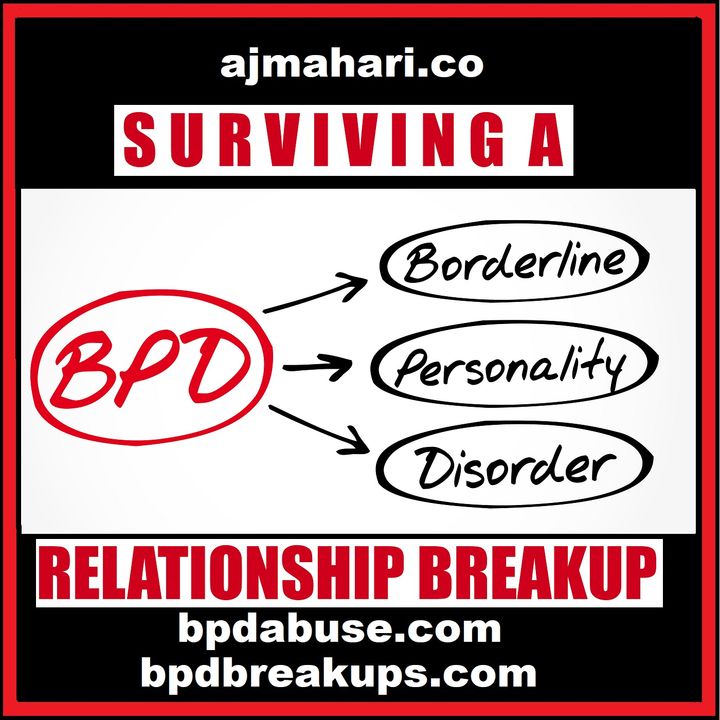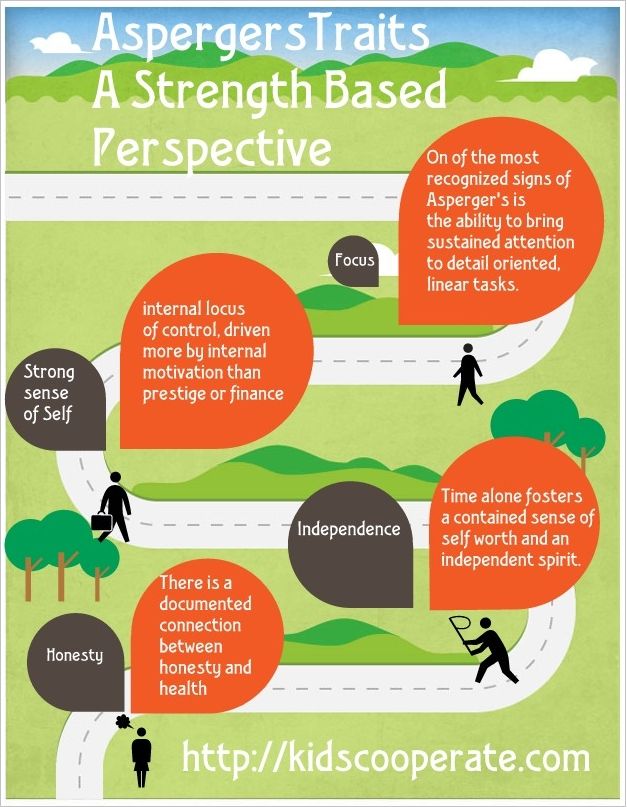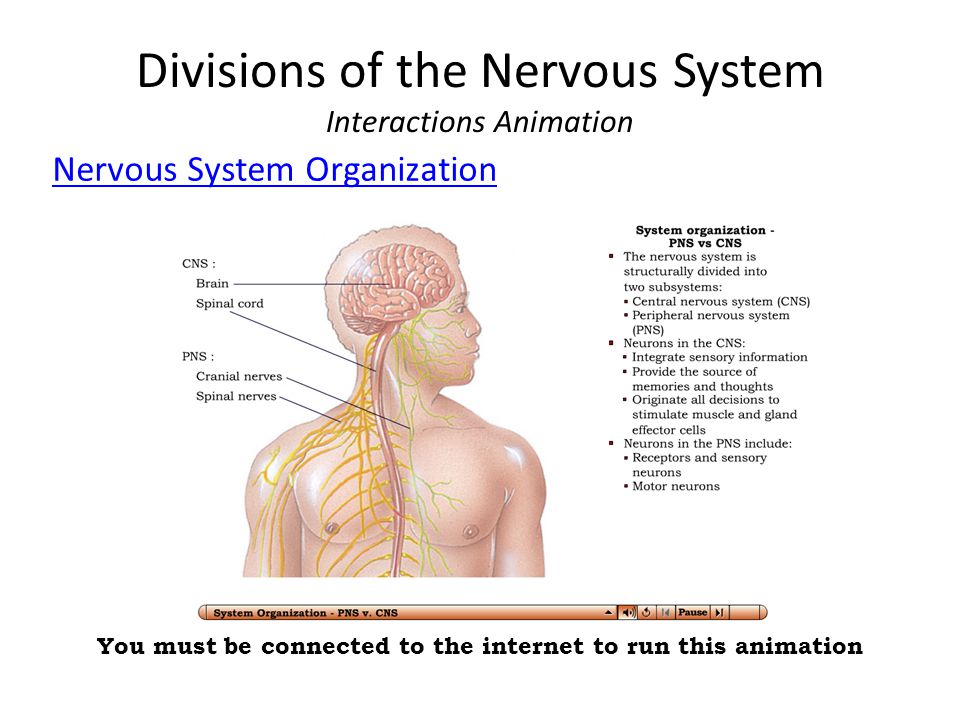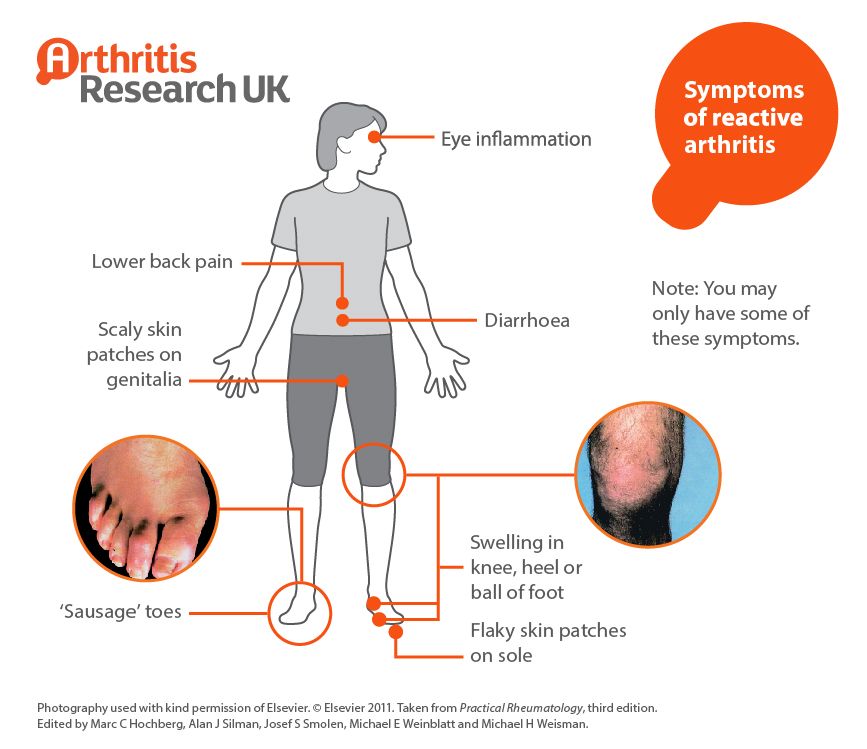Break up borderline personality disorder
Breaking Up With Your Loved One With BPD
Be Kind, Be Firm.
Source: Ben_Kerckx/Pixabay
You have tried everything to save the relationship. You have come to the realization that your relationship is unhealthy for you and that you have to get out. You don’t want to inflict pain on your loved one, but you cannot continue. If your loved one has symptoms of borderline personality disorder (BPD), they may not take the break up well. Here are some tips to help you minimize the pain to your loved one and to yourself while you free yourself from an unhealthy relationship.
Remain Calm, Remain Respectful
It is essential that you remain calm and respectful at all times. Individuals who struggle with symptoms of BPD tend to lash out when feeling attacked or frustrated. This is almost certain to happen when you reject them. While it might seem natural to mirror their hurt and anger, this will only escalate the situation. Do not be sarcastic, snarky, or demeaning. This will result in your loved one justifying being in a victim position and lashing out at you.
Do Not Blame
Healthy individuals often look to understand why the relationship did not work. Sometimes constructive conversations about this can occur. Individuals who suffer from symptoms of BPD may ask what they did wrong, but they very often hear these explanations as attacks on their character and become defensive or sometimes hostile. In the following exchange, Geri tells Rory that she does not want to live together anymore.
Geri: Rory, I'm going to move into my own place.
Rory: You're leaving me?!
Geri: Yes.
Rory: You're horrible.
Geri: I'm not trying to hurt you.
Rory: Well, you are hurting me. What did I do wrong?
Geri: You didn’t do anything wrong.
Rory: Oh, so you're leaving me because I'm perfect?
Geri: I can’t be in a relationship where I feel controlled.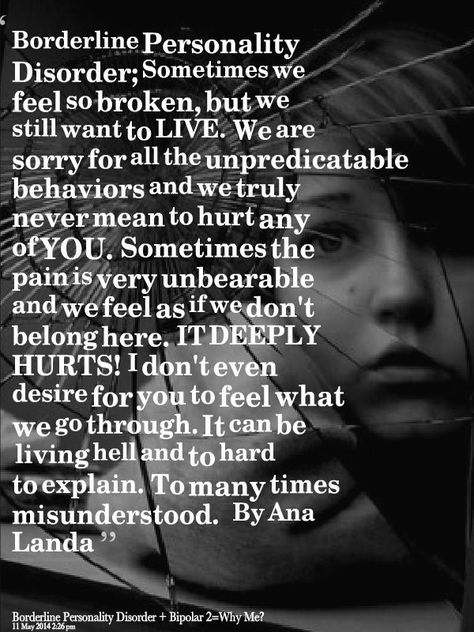
Rory: So I’m controlling?!
Geri: I don’t like having to always let you know where I am and what I'm doing.
Rory: You must hate me.
Geri: I don’t hate you.
Rory: I wish I'd never met you.
Geri felt like she didn't have a choice. She tried not to say anything to Rory that might be angering but when asked directly why she was breaking up with him, Geri felt that she had to be honest. They both got hurt.
Do Not Be Defensive
In the above dialogue, Geri was defensive on a number of occasions. Statements such as “I'm not trying to hurt you” and “I don’t hate you” only made Rory angrier. This is because defensiveness is fundamentally invalidating. It's like trying to convince Rory that his feelings are based on misperception or incorrect interpretation. It's like telling Rory that he is crazy, stupid, or wrong. Of course, he has an undesirable response.
Offer Validation Generously
Replacing defensiveness with validation will be helpful.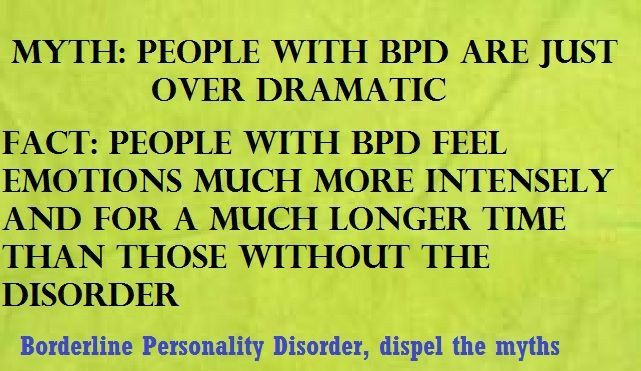 For example, when Rory said “You hate me,” Geri might have said, “I can see why you would feel that way. I am sorry for hurting you."
For example, when Rory said “You hate me,” Geri might have said, “I can see why you would feel that way. I am sorry for hurting you."
This will not make Rory happy, but at least Geri’s validation will not feel like a further attack.
Set and Enforce Boundaries as Necessary
When you break up with your loved one with symptoms of BPD, they are likely to lash out at you. You have made their worst fear come true. You are abandoning them. It does not do them or you any good to allow them to hurt you. It will not make them feel better and it will make you feel worse.
If you are being yelled at or physically threatened, be prepared to state that the behavior is unacceptable and that if it does not stop immediately, you will leave and the conversation will be over. Don’t say this more than once. If the aggressive behavior returns, then you turn and leave. You can have another conversation with the person at another time if you wish to but you must convey that aggressive hurtful behavior will not be tolerated. If you don’t do this, the behavior will get worse.
If you don’t do this, the behavior will get worse.
A Sample Script
There is almost no way that your loved one will not be hurt and angry when you break up with them. The following sample script incorporates the above elements in an effort to minimize the hurt that Rory will feel and the conflict that follows.
Geri: I'm moving into my own place.
Rory: You're leaving me?!
Geri: I'm grateful for the chance to live with you, but I feel that I need to be on my own now.
Rory: What did I do wrong?
Geri: You didn’t do anything wrong. I just need to be by myself in order to grow.
Rory: So I prevent you from growing?!
Geri: No. I prevent me from growing when I'm not fully responsible for myself.
Rory: So it's all about you.
Geri: I am being selfish. I'm sorry that it hurts you.
Rory: I hate you for dumping me.
Geri: I understand your feelings. I wish that I could do this without hurting you.
Unilaterally ending a relationship is always hurtful to the person being left, whether they have symptoms of BPD or not. Individuals with BPD are likely to suffer more than other individuals because their condition causes an intense fear of being abandoned and because they may struggle more than most to regulate their emotions. The impact of leaving someone you love or used to love will be minimized by being compassionate and respectful and by taking responsibility for your choice rather than trying to justify your decision.
Breaking Up with Someone Who Has Borderline Personality Disorder
You’ve heard it before: breaking up is hard to do. And if you are in a relationship with someone diagnosed with Borderline Personality Disorder (BPD), you may find breaking up with them to be even more of a challenge.
If you’re in a relationship with someone who has Borderline Personality Disorder, you already know their emotions can run a full gamut. And you probably already know that one of the underlying symptoms of BPD is a crippling fear of abandonment. Their quickly changing moods and swirling emotions can cause irreparable damage to a relationship, which could result in you wanting out of the relationship.
And you probably already know that one of the underlying symptoms of BPD is a crippling fear of abandonment. Their quickly changing moods and swirling emotions can cause irreparable damage to a relationship, which could result in you wanting out of the relationship.
There’s never an easy way to break up with somebody you’re in a relationship with, and how it happens is going to vary wildly depending on the people and the situation. However, there are a couple of common scenarios people find themselves in when breaking up with someone who has Borderline Personality Disorder.
People who opt for the fight response when ending a relationship will directly confront the person with Borderline Personality Disorder and tell them why they want to end the relationship. This is typically the healthier – and more mature – way to end the relationship because it’s honest and lets you say everything you need to say.
However, the person you are breaking up with might not see it that way.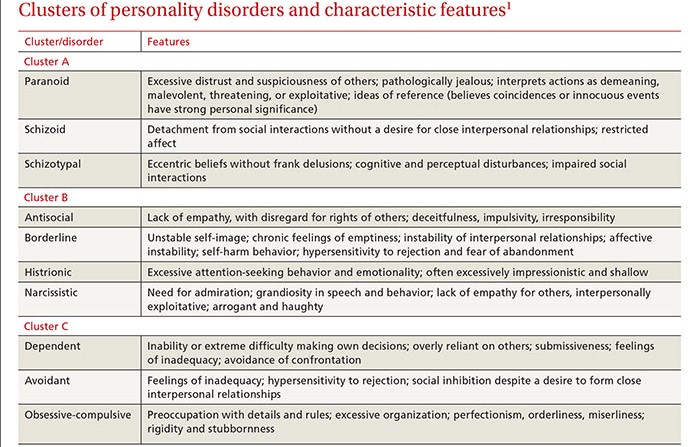 They may get severely depressed or lash out if they know you are breaking up with them. Someone with Borderline Personality Disorder may also engage in self-harm and other destructive behaviors.
They may get severely depressed or lash out if they know you are breaking up with them. Someone with Borderline Personality Disorder may also engage in self-harm and other destructive behaviors.
If you do opt for this method, make sure to carefully choose which words you are going to use, try to not be too confrontational, and try to engage in a rational conversation instead of being accusatory.
People who opt for the flight response when ending a relationship will try to slip away quietly by completely cutting off contact with their partner with Borderline Personality Disorder. While this might seem like the safer option, it’s also the more damaging and more dangerous one.
Many people with BPD have a crushing fear of abandonment, and it doesn’t take much to trigger this fear. This can result in the person with BPD engaging in destructive behaviors that can hurt themselves, their livelihoods, and you as well.
Fleeing a relationship instead of discussing a break up with your partner can lead to a lot more questions than answers, and will likely be harmful to both parties.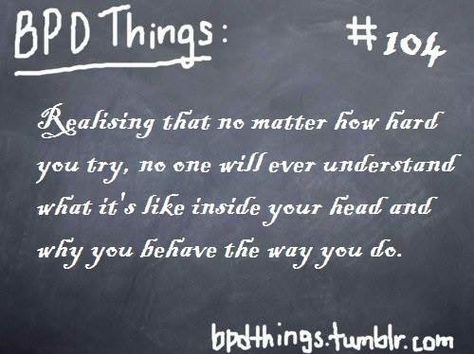
So what should you do if you want to end a relationship with someone with Borderline Personality Disorder? Dialectical Behavioral Therapy (DBT) offers the following interpersonal effectiveness skills for relationships that can be applied to break ups:
- Gentle: Don’t attack, threaten, or lay guilt trips.
- (Act) Interested: Listen to what your partner has to say, don’t interrupt them, and be sensitive to what they are feeling.
- Validate: Be non-judgmental and validate their feelings and problems.
- Easy Manner: Try to be lighthearted and ease your partner along.
Having a gentle demeanor and an easy manner will likely keep the conversation as balanced as possible, and if you validate your own feelings as well as your partner’s, it will likely make the discussion much easier.
Breaking up is never easy, but with care, compassion and discussion, it is hoped that your break up with someone diagnosed with Borderline Personality Disorder is as smooth as possible.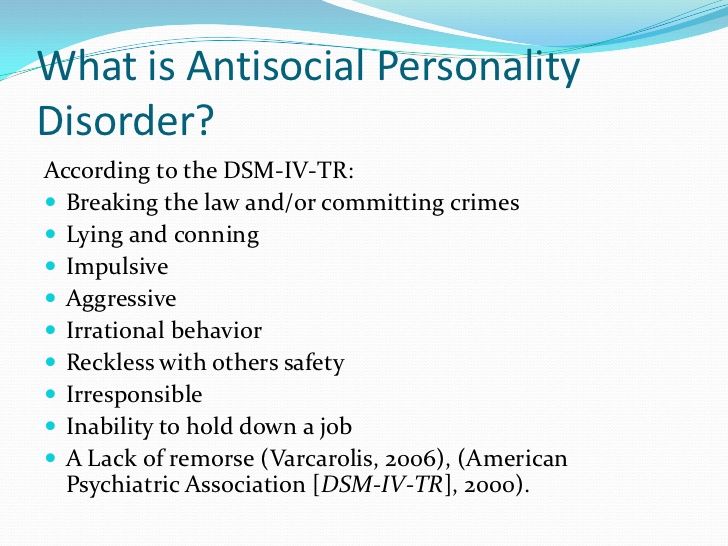
How to treat borderline personality disorder in adolescents?
The diagnosis of "borderline personality disorder" is often made by specialists who cannot accurately determine the patient's illness. They attribute to this disorder symptoms that are characteristic of other syndromes: bipolar disorder, depression, anxiety disorder, panic attacks, etc. The symptoms of borderline personality disorder resemble a critical manifestation of normal behavior during adolescence. As a rule, this disease begins to be diagnosed in patients aged 12-13 years. The symptoms are most pronounced by the age of 16-25, and by the age of 40-45 their intensity decreases, although the disorder itself can remain for life. nine0003
The main symptoms of borderline personality disorder are emotional instability and severe mood swings. These differences also apply to relationships with other people. One moment a person may be nice to another, and the next, hate him. Another common symptom is inner existential emptiness. A person feels emptiness and does not know how to fill himself. This condition can lead to depression or an anxiety disorder. A person can try to solve these problems by showing suicidal tendencies - hurting himself and thus filling the inner emptiness. Often teenagers in this condition may start taking drugs and drinking alcohol. Sometimes this behavior can lead to alcoholism, drug addiction, or suicide. nine0003
One moment a person may be nice to another, and the next, hate him. Another common symptom is inner existential emptiness. A person feels emptiness and does not know how to fill himself. This condition can lead to depression or an anxiety disorder. A person can try to solve these problems by showing suicidal tendencies - hurting himself and thus filling the inner emptiness. Often teenagers in this condition may start taking drugs and drinking alcohol. Sometimes this behavior can lead to alcoholism, drug addiction, or suicide. nine0003
The therapy process accepts the suffering of the patient, but does not accept destructive behavior, drug or alcohol use.
Relatives usually do not know what to do with such people, and psychologists do not always understand how to properly approach their treatment. As a rule, borderline personality disorder appears in adolescents from dysfunctional families, where there was a lot of aggression, screaming, quarrels, and sometimes violence.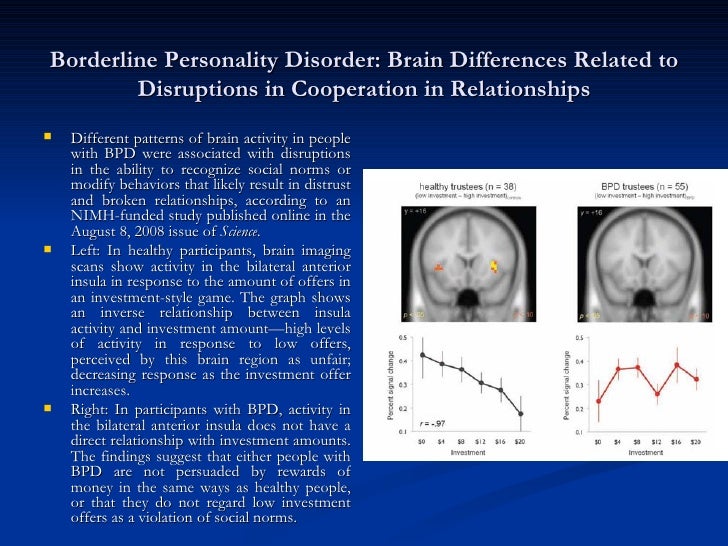 Such patients may have attention-deficit/hyperactivity disorder as a comorbid disorder. nine0003
Such patients may have attention-deficit/hyperactivity disorder as a comorbid disorder. nine0003
See also
What is borderline personality disorder?
The most effective treatment for borderline personality disorder is dialectical behavior therapy. The therapy process accepts the suffering of the patient, but does not accept destructive behavior, drug or alcohol use. During the behavioral part of therapy, a strict program is built to avoid the patient's suicidal tendencies or the use of illegal substances. Specialists give behavioral techniques that replace what, in a state of disorder, the patient determines effective for himself. nine0003
Also, for the treatment of this syndrome, family instruction is required, in which relatives are explained how to properly respond to human behavior and set boundaries. Medication is also an important part of the program. Unfortunately, at the moment there are no drugs that can completely cure borderline personality disorder, but there are drugs that reduce emotional instability, depression and anxiety.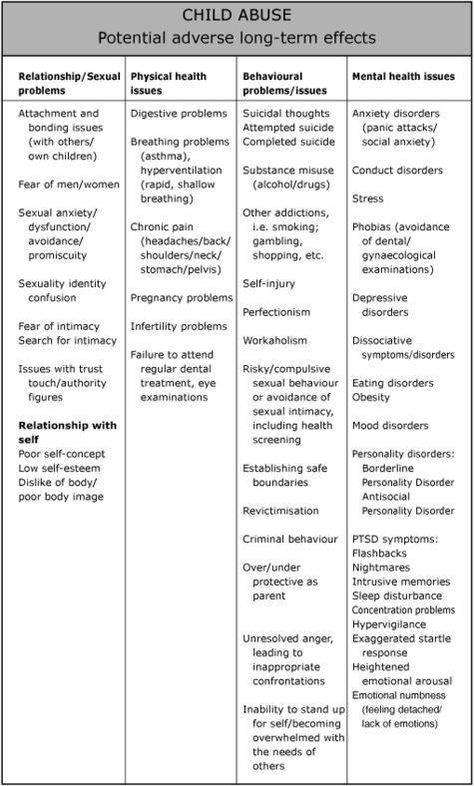 Such treatment helps the patient to socialize in society and receive tools that change his attitude towards himself and others. nine0003
Such treatment helps the patient to socialize in society and receive tools that change his attitude towards himself and others. nine0003
- Diseases and disorders
Share:
How to keep borderline personality disorder from ruining your life
July 8, 2021 Likbez Health
Perhaps illness is to blame for temper tantrums and failed relationships. And it can be cured.
You can listen to this article. If it's more convenient for you, turn on the podcast:
What is borderline personality disorder
This is a serious mental illness. People with borderline personality disorder find it difficult to control their emotions and behavior, build stable relationships, and often have problems with self-esteem. They may also endanger or harm themselves. For example, leaving burns on the skin, having sex with random partners, getting into fights, violating traffic rules.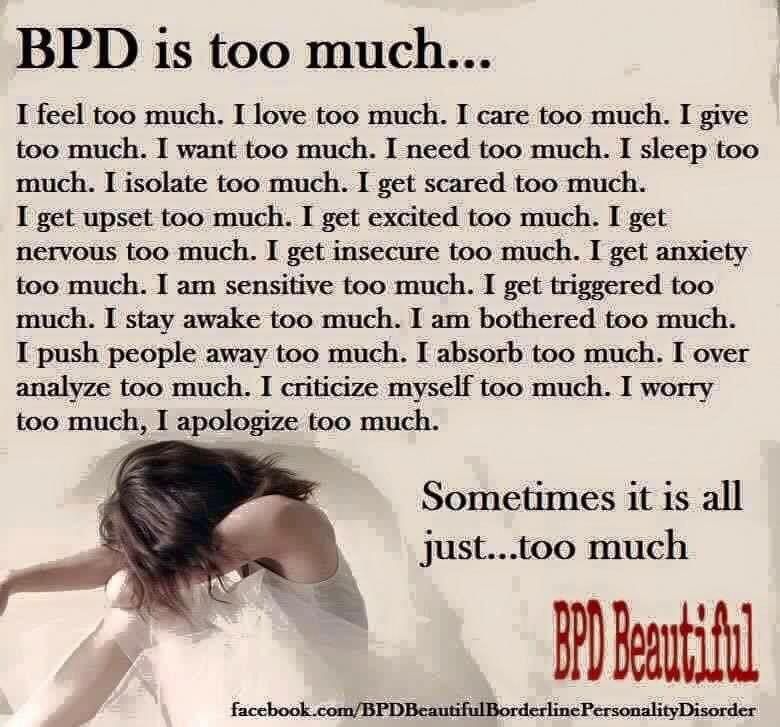 Sometimes it comes to suicide attempts. nine0003
Sometimes it comes to suicide attempts. nine0003
The condition is also dangerous because other mental illnesses may appear along with it. For example, depression, bipolar disorder, eating disorders.
Borderline disorder affects approximately 2% of young people. Most often it is found in women. Men are sometimes mistakenly diagnosed with depression or post-traumatic stress disorder.
What are the causes of borderline personality disorder
No one knows for sure where borderline personality disorder comes from. Scientists only suggest that there may be three reasons. nine0003
Heredity
Those who have relatives with borderline personality disorder are more at risk of getting sick. This is suggested by scientists who interviewed 112 pairs of twins.
Brain malfunction
Research shows that people with borderline disorder sometimes experience structural and functional changes in the brain. This is especially true of areas that control impulses and emotions.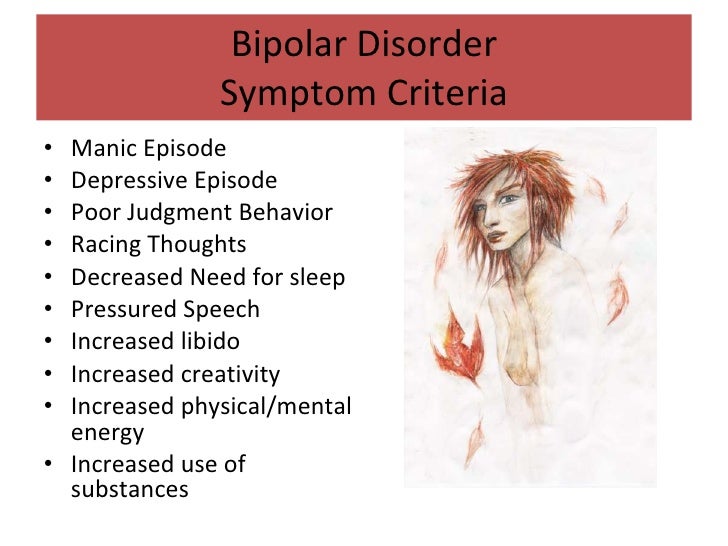 There are failures before the disease or because of it, it is not yet clear. nine0003
There are failures before the disease or because of it, it is not yet clear. nine0003
Surroundings
Some patients say that they experienced stress in childhood. For example, physical or sexual abuse, separation from parents. Others have had toxic relationships or serious conflicts.
How to recognize borderline personality disorder
People with borderline personality disorder are emotionally unstable. As a result, their behavior changes. Here are the symptoms by which you can suspect the disease:
- Sudden mood swings. Feelings of happiness, irritability, or anxiety can last from a few hours to several days. nine0027
- Constant feeling of emptiness.
- Strong or inappropriate anger. The person can be sarcastic, spiteful, and even get into fights.
- Rapid changes in self-esteem and self-identification, goals and values. Just now everything was fine, but after a minute, a person with a disorder considers himself bad or behaves as if others do not exist.

- Unstable relationships with loved ones. A person either idealizes people, then suddenly decides that they do not care about him, or accuses them of something, for example, of cruelty. nine0027
- Fear of being abandoned. In an attempt to avoid real or imagined rejection, a person may quickly start an intimate relationship (physical or emotional) or abruptly end the relationship.
- Impulsive and often dangerous behavior: shoplifting, unprotected sex, traffic violations, overeating, drug use. But if all this manifests itself when a person is in a good mood, the symptom indicates rather a mood disorder.
- Feeling of dissociation. In this state, it seems to a person that he is as if torn off from the body and looks at himself from the side. And everything that happens looks unrealistic. nine0027
- Self-damaging behavior. A person can cut his own skin and leave burns on it. Sometimes the desire to harm oneself comes to suicide attempts.
- Attacks of paranoia.
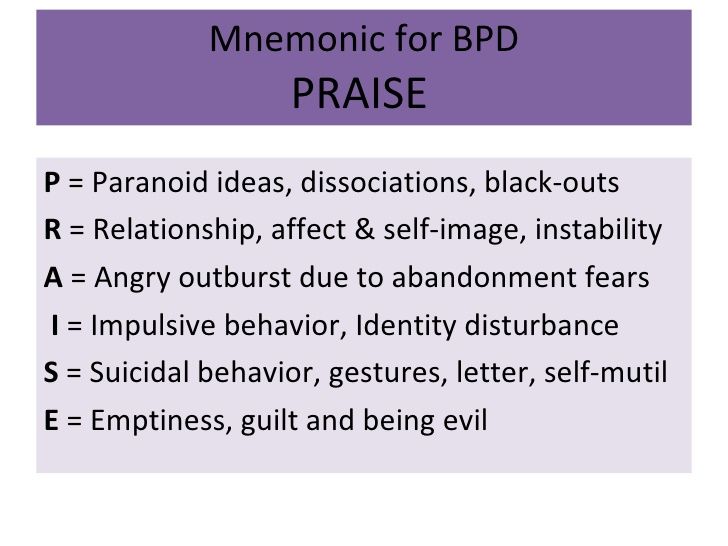 A person with a disorder often worries that people around them don't really like them and don't want to spend time together. Even if it's not.
A person with a disorder often worries that people around them don't really like them and don't want to spend time together. Even if it's not.
Not all people with borderline personality disorder experience a full list of symptoms. Trifles can call them. For example, a business trip of a loved one. The severity of the manifestations and their duration depend on the person. nine0003
What to do if you have suicidal thoughts
If you are thinking about hurting yourself or killing yourself, get help. It can be obtained in several ways:
- Contact a psychologist on the website of the Ministry of Emergency Situations.
- If you live in Moscow, dial 051 from a landline or +7 (495) 051 from a mobile phone. nine0027
- Leave a request on the website of the Moscow Service for Psychological Assistance to the Population. The specialist will advise you, even if you do not live in the capital.
- Call your psychologist.
- Contact a loved one.
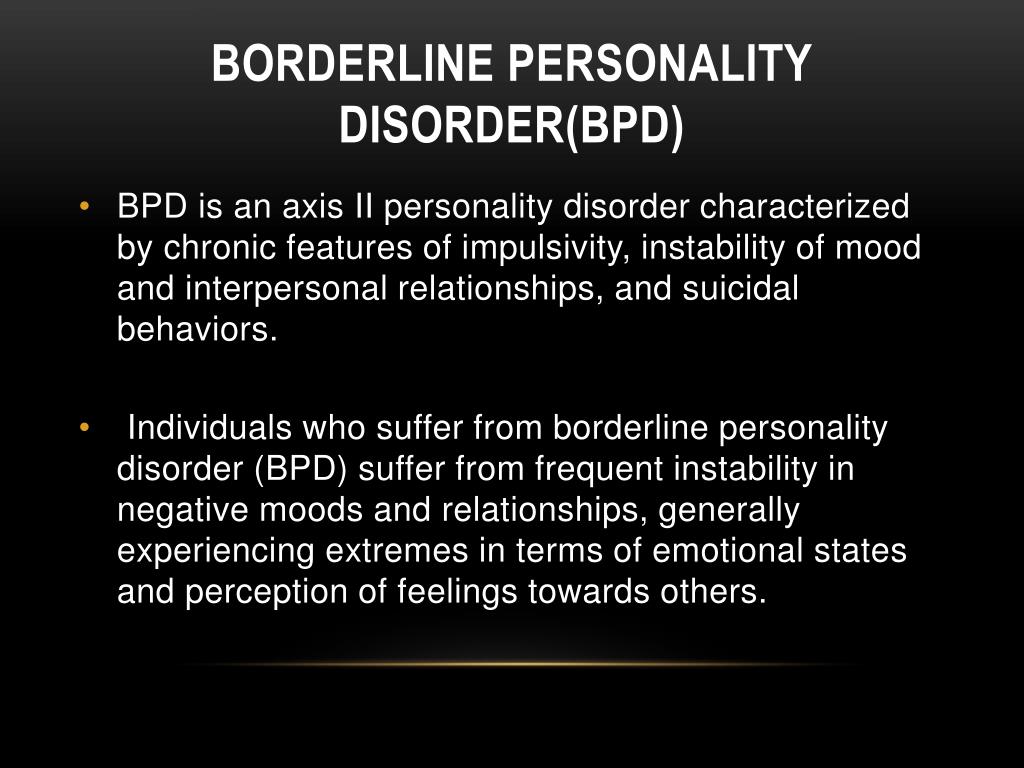 It could be a friend, relative or loved one.
It could be a friend, relative or loved one.
How borderline personality disorder is treated
Different. First of all, you need to contact a therapist. They will take a complete medical history and may order a blood test or X-ray to rule out physical causes of symptoms. nine0003
If everything is in order with the body, the doctor can send the patient to a psychotherapist or psychiatrist. He will talk with the person, find out if there were mental illnesses in the family. Recognizing borderline disorder can be difficult due to additional illnesses. For example, depression or an anxiety disorder.
Once a diagnosis has been made, the doctor will prescribe the appropriate therapy.
Psychotherapy
Several types of talking therapy have been developed for people with borderline personality disorder:
- Dialectical behavior therapy. Teaches you to control strong emotions and not harm yourself. After treatment, patients often improve relationships with others.
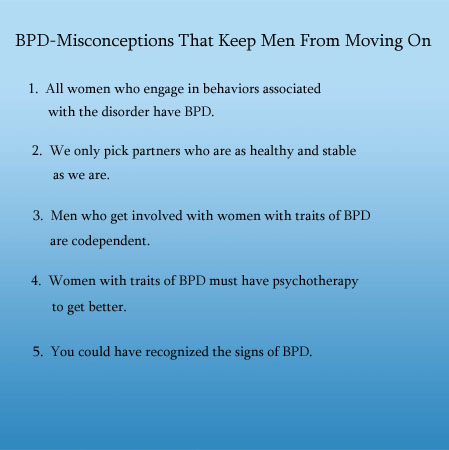
- Cognitive behavioral therapy. Helps people with the disorder find and change beliefs that damage self-esteem and relationships. After classes, patients almost do not feel anxiety and harm themselves less.
- Circuit therapy. It is carried out individually or in a group. Helps to remember the unmet needs that have caused the patient to habituate to inappropriate behaviors. For example, in childhood, a child screamed to draw the attention of his parents to himself. Once it could help, but now it only hurts. In the classroom, a person can learn to behave correctly and achieve goals in adequate ways. nine0027
- Therapy based on mentalisation. Helps patients identify their feelings and emotions and deal with them more calmly. The emphasis is on what a person should first think and then do.
- Systemic Training for Emotional Predictability and Problem Solving (STEPPS). The treatment is designed for 20 weeks and takes place in a group where the patient and his relatives get.
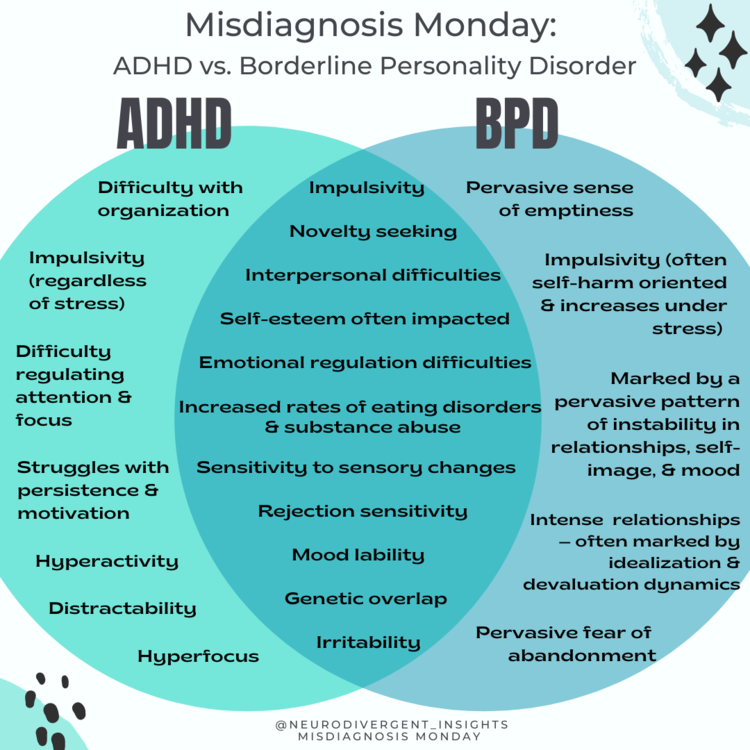 It is used as an adjunct to other types of psychotherapy.
It is used as an adjunct to other types of psychotherapy. - Transference-focused psychotherapy (psychodynamic therapy). During the session, the patient tells the specialist about situations when he behaved aggressively. Together with the doctor, the patient is looking for other behaviors, and then tries to apply them in life. nine0027
- General psychiatric department. Treatment takes place during work or study. The patient himself tries to catch and comprehend emotionally difficult moments. A person can also take medications, work with a psychotherapist individually or with his family.
Medications
Medications are not the primary treatment for borderline personality disorder. They are prescribed to relieve the patient of symptoms of depression, aggression or anxiety. These can be antidepressants, antipsychotics, or mood stabilizers. nine0003
Some medicines cause side effects. The doctor will tell you what to expect from a particular drug.
Hospitalization
Sometimes patients with borderline personality disorder require treatment in a psychiatric clinic.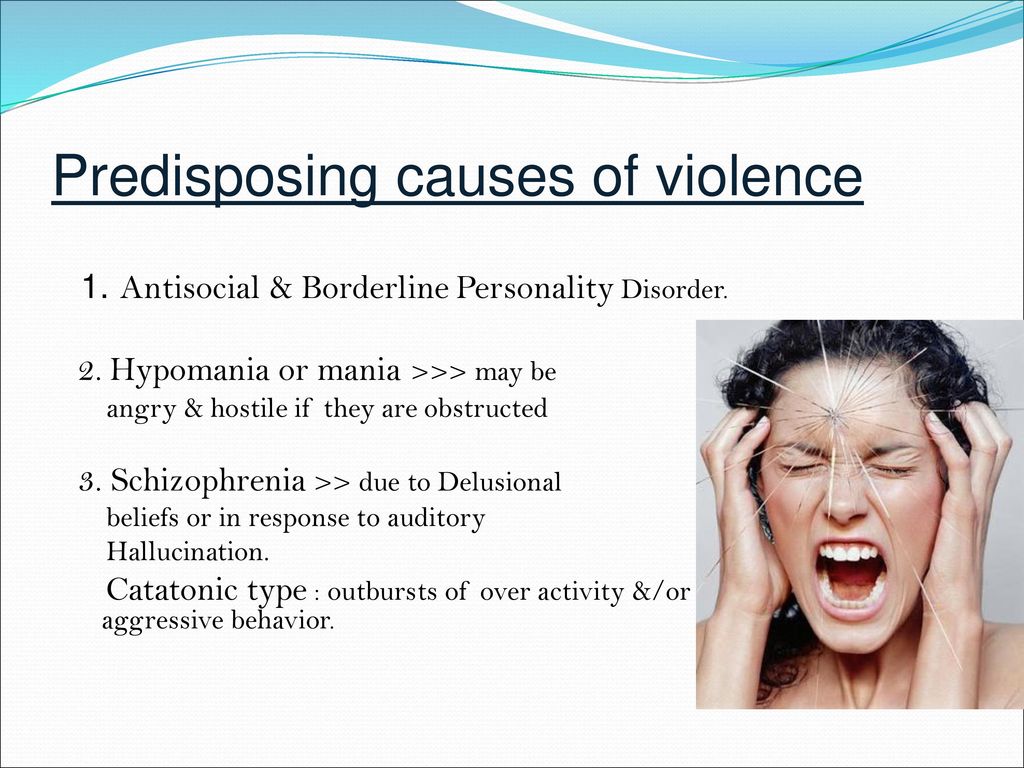 It helps people not harm themselves and get rid of suicidal thoughts.
It helps people not harm themselves and get rid of suicidal thoughts.
How successful treatment can be
The outlook for people with borderline personality disorder varies. Recovery is possible, but not always. In any case, it is a slow and difficult process. Some patients, with the help of therapy, begin to lead a normal life and learn how to communicate properly. nine0003
For reasons unknown, the disease tends to burn out. Therefore, sometimes people with the disorder notice that their condition has improved by the age of 35–40.
Living with Borderline Personality Disorder
If you have borderline personality disorder and are already in therapy, don't stop there. Here are some tips to help you manage your illness so you don't hurt yourself or others:
- Learn to recognize what triggers anger or impulsive behavior. nine0027
- Try to get rid of other borderline problems. For example, from alcoholism or drug addiction.
- Ask loved ones to join the therapy.
